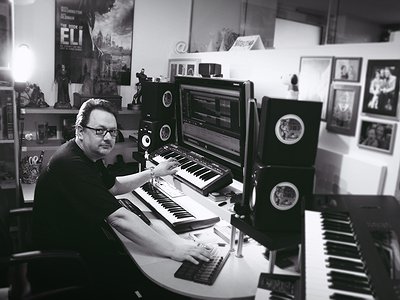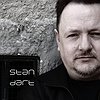Collaborations can take on many forms. What role do they play in your approach and what are your preferred ways of engaging with other creatives through, for example, file sharing, jamming or just talking about ideas?
I love to collaborate. It´s the best way to enhance your skills, to improve your way of working and – most of all – to become a modest person again. The longer you work on your own tracks and receive positive feedback the more you risk becoming a show-off who thinks he´s the best in the world (worship me!!).
Of course you have to talk with your partner first – to check out if he´s open for your ideas, and if you are open minded enough the other way round. Working together always means to combine the best of both worlds. Sometimes your partner has more to say, sometimes it´s your turn. That´s what you have to be able to handle.
I had a lot of collaborations in the past and most of them were great. The best example of a fantastic collaboration is my work with Mark Dorricott. He´s a British keyboarder with jazzy roots and he plays melodies in such a dreamy way, that even listening to one of his tracks brings ideas into my mind. Our collaborations were one of the best works for me in the past. Mark is very open minded, always listening to my arguments and giving me the space I need to develop ideas. In return, I always intend to give Mark the needed space for his wonderful performances in our tracks and I listen carefully to all comments he makes when he´s reviewing a track.
Could you take us through a day in your life, from a possible morning routine through to your work? Do you have a fixed schedule? How do music and other aspects of your life feed back into each other - do you separate them or instead try to make them blend seamlessly?
I don´t have a strictly fixed schedule, but during the week, I try to work on my tracks on a daily base – mostly starting in the early evening (7 pm) with an open end (mostly 1 am). I try to organize my time, so that I can spend time with my family, handle my job and compose my music.
So mainly the daily routine is like this:
7 am off to work
4 - 5 pm back from work
5 – 7 pm family time
7 pm – 1 am music time
It´s not always that way, but most of the time I try to work that way. The weekend is different – almost chaotic, if there are no plans to do some stuff with my family, it´s most likely that I´m sitting in my studio the entire day .
Also, there are days, where I do not enter the studio. Very often when I finished a project, I need some vacation from it. But after a few days I have to return ... :-)
Could you describe your creative process on the basis of a piece or album that's particularly dear to you, please? Where did the ideas come from, how were they transformed in your mind, what did you start with and how do you refine these beginnings into the finished work of art?
For my current project “ECCLESIA” I went into the cathedral of my hometown Graz and walked around (impressed by the way this church was built) to find inspiration for songs/themes about this building. While walking around I discovered a small wooden crucifix and the roman number for twelve standing beside it on one of the huge pillars. It was the symbol for the twelfth station in the bible where Jesus died. While looking at it, I got the idea for the song “Hora Tenebrarum (The Dark Hour)” where I thought about whether Jesus was fearful or angry in the moment when he died. Did he regret his life and his decisions, which lead him to this moment? I think we all have – or will have - similar thoughts when we reach this moment.
There are many descriptions of the ideal state of mind for being creative. What is it like for you? What supports this ideal state of mind and what are distractions? Are there strategies to enter into this state more easily?
The example of “Hora Tenebrarum” is a typical situation for me in terms of getting an idea for a song. It´s unpredictable for me when inspiration sends me the idea. It´s more the problem to keep this idea long enough in my mind in order to write some music in my studio.
I don´t have a certain strategy, I just try to walk around with an open mind and look and listen to everyone and everything I see and meet. Okay, in the end, this does seem to be my strategy in a way …
How is playing live and writing music in the studio connected? What do you achieve and draw from each experience personally? How do you see the relationship between improvisation and composition in this regard?
I never played live before, but I think that´s the next level I want to reach. I´m aware that playing live has nothing in common with your totally controlled work in a studio. It´s a challenge, where you get new skills which can be used later in your future work in the studio. Therefore I´m looking forward to find a way to present my music in the public.
How do you see the relationship between the 'sound' aspects of music and the 'composition' aspects? How do you work with sound and timbre to meet certain production ideas and in which way can certain sounds already take on compositional qualities?
For me a certain sound is very important, because this sound can bear the idea for the whole track in it. Playing a melody with various sounds can produce a new sound – a sudden and certain timbre, which is essential for the idea of the track. So, this melting process of different sounds is typical for my tracks. Sometimes I produce the right mood accidentally, sometimes I choose certain known sounds and mix them as long as I find the right mixture.
Our sense of hearing shares intriguing connections to other senses. From your experience, what are some of the most inspiring overlaps between different senses - and what do they tell us about the way our senses work? What happens to sound at its outermost borders?
When I listened to “The Moldau” by Smetana the first time, I saw this river right before me as it flows through the countryside. It was pure magic. Still today I ask myself how someone could compose such a wonderful melody which describes the countryside so perfect.
I think our senses are connected – and when reaching one of them, it will influence all others too: Listening to a calm melody makes you calm too, you start breathing slowly and so on …. Being in that mood you´re facing the world differently; you let your mind go – and it all starts by listening to music.
Art can be a purpose in its own right, but it can also directly feed back into everyday life, take on a social and political role and lead to more engagement. Can you describe your approach to art and being an artist?
Do I see myself as an artist? I don´t know … never really thought about that. With my music I try to tell stories, so if that´s an approach befitting an artist, it´s ok to me to call me an artist. Composing and painting are quite the same: whereas the painter uses different colours to express a mood by painting a scene, I choose special sounds and effects to describe the story within the music That's my approach.
It is remarkable, in a way, that we have arrived in the 21st century with the basic concept of music still intact. Do you have a vision of music, an idea of what music could be beyond its current form?
Looking at the current way music is treated makes me worry, if there will be a place for creativity in the future. But I hope as long as there are people who want to tell a story, there will be ways and places where artists are able to present their work of art.



